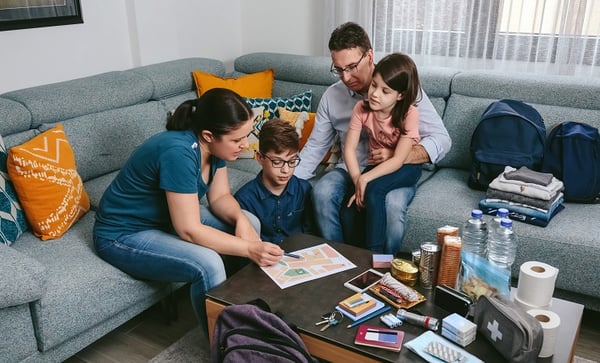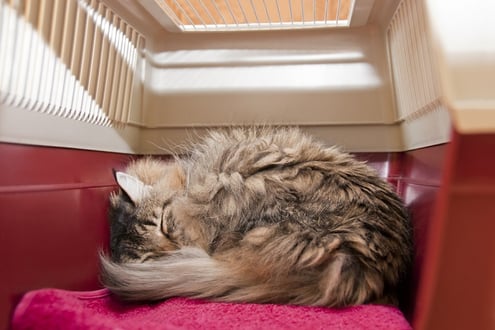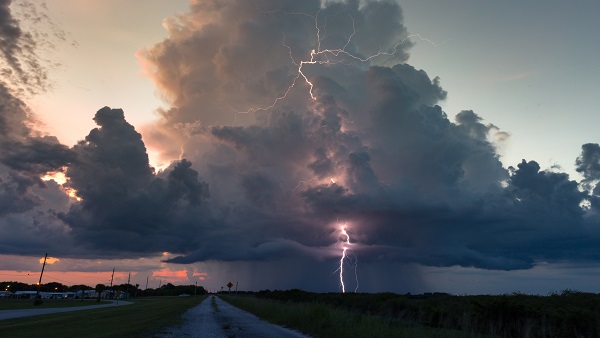
We pledge to provide straight talk from our NNINS Virginia insurance experts. Read the Northern Neck Insurance Integrity Promise.
Virginia has a variety of severe weather throughout the year, including tornadoes, thunderstorms, hurricanes, heavy wind, hail, and flooding rain. Whether you're new to Virginia or have lived here for some time, we have well-sourced and helpful information to help you prepare and protect your family and property when severe weather season hits.
Have a family plan for severe weather in Virginia
- Download the FEMA app and local news apps for severe weather alerts.
- Locate a homeless shelter if needed.
- Prepare an emergency kit to sustain your family after a disaster. Depending on the severity of the disaster and your geographic location, assistance may take several days or weeks to reach you and your family.
- Exercise the best ways to prepare your home and car for a tornado.
- Wear layers of loose-fitting, lightweight, warm clothing that will keep you warm, but you can take off to cool down.
- Be prepared to evacuate if you lose power and know your hurricane evacuation zone: Virginia Know Your Zone.
- Find a local emergency shelter at the Virginia Department of Emergency Management.
- Buy a battery-operated and hand-crank weather radio.
- Locate copies of your insurance policy.
- Have family and emergency contact information available.
- Get extra cash. In a power outage, ATMs may not be working.
- Have a home inventory.
How to stay aware of severe weather in Virginia
Tornadoes in Virginia
Tornadoes can happen in Virginia at any time of year and any time of the day or night. They happen most frequently between early spring and July and between the hours of 4 pm and 9 pm. It's important to sign up for local weather alerts and know the signs that a tornado may be imminent in your area.
Common tornado signs:
- Dark, greenish sky
- Large hail
- Low-lying clouds, particularly if rotating
- Loud roar, similar to a freight train
Know the difference between a Tornado Watch and a Tornado Warning
The National Oceanic and Atmospheric Administration (NOAA)/ National Weather Service issues both tornado watches and warnings. However, there are critical differences between the two alerts. A tornado warning means a tornado has been detected or spotted, while a tornado watch indicates that a tornado is possible.
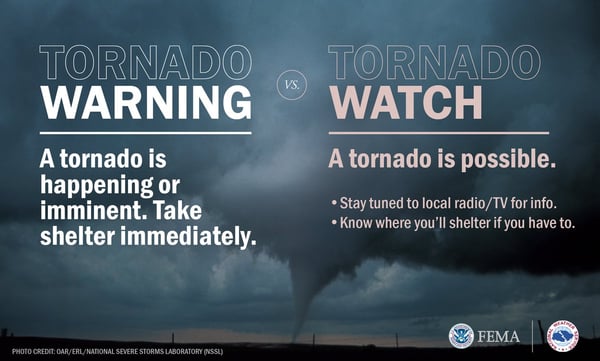
How to stay informed on social media of severe weather in Virginia
Stay ahead of local weather, especially before you head out the door and get on the road. Track storms and make appropriate preparations for the worst-case scenario. The Virginia Department of Emergency Management (VDEM) has great resources for your family when storms are approaching Virginia. They also have an active Facebook page you can follow.
The National Weather Service for Virginia has social media communication channels in 4 regions:
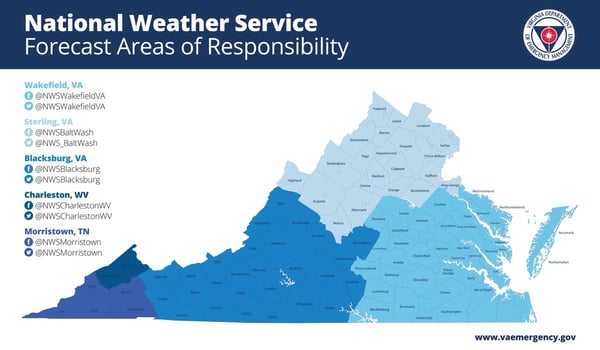
National Weather Service for Virginia On Twitter
- Central Virginia: @WakefieldVA
- Southwest Virginia: @NWBlacksburg
- Northern Virginia @NWS_BaltWash
- Tennesee: @NWSMorristown
- West Virginia: @NWSCharlestonWV
National Weather Service for Virginia On Facebook
- Central Virginia: @WakefieldVA
- Southwest Virginia: @NWBlacksburg
- Northern Virginia: @NWS_BaltWash
- Tennesee: @NWSMorristown
- West Virginia: @NWSCharlestonWV
You can also report a road issue to the Virginia Department of Transportation (VDOT) at 1-800-367-7623 (FOR-ROAD). Just don't report hazards while you're driving. Pull over safely or wait until you get home. For life-threatening emergencies, please dial 911.
Check Virginia airports for travel delays
Click the links for updated flight information.
- Richmond Airport
- Reagan International Airport
- Washington Dulles Airport
- Roanoke Blacksburg Regional Airport
- Norfolk International Airport
- Newport News/Williamsburg International Airport
- Lynchburg Regional Airport
- Charlottesville/Albemarle Airport
- Shenandoah Valley Regional Airport
How to prepare before severe weather
Prepare your home
- Secure loose or weak fencing and mailboxes.
- Anchor heavy objects, such as play equipment and trampolines, deep into the ground.
- Trim tree branches close to home.
- Bring in smaller loose items.
- Floodproof your basement.
- Test your sump pump if you have one.
- Unplug expensive electronics and appliances if you do not have surge protection.
- Prepare the outside of your home for severe weather season.
- Understand and consider flood insurance for your area's risk. Your local agent is an excellent source of help! Be aware that there is generally a waiting period between 14 and 30 days for certain types of flood insurance to take effect.
- Have working smoke and carbon monoxide detectors.
- Charge your electronics.
How to stay safe during severe weather
- If you are in a mobile home and receive a tornado warning, leave and get to a safer location! Even if the home is tied down, you are probably safer outside.
- Keep windows closed and doors shut, including interior doors and garage doors.
- Place infants and young children in car seats, even when indoors.
- Choose an interior room with no windows on the lowest floor of your home, such as a basement, storm cellar, bathroom, or closet. Add pillows, helmets, and shoes to this area.
- Leash your pets or place them in a carrier and keep them with you.
- If you lose power, avoid using candles. Keep them at least 3 feet away from children, pets, and anything flammable if necessary.
How to keep your pets and livestock safe
- Have extra pet food and water on hand, plus any necessary medications.
- Bring your animals inside and ensure your horses and livestock have unimpeded access to shelter, food, and clean water.
- Make sure your pets are current on their vaccinations.
- Have a current picture on your phone.
- Ensure your pet wears a collar with identification and keep a leash on hand.
- Have properly sized pet carriers.
- Have a place to take your pet – kennels, veterinary clinics, and the homes of friends and relatives are all places you can take your pet in an emergency.
- Find a pet-friendly motel if you need to evacuate.
How to stay safe after severe weather
We're close by and ready to help! After tornadoes and other disasters, we will first contact those with the worst losses. Rest assured, we work around the clock to handle claims until all of our members are taken care of. Call our 24/7 Claims Hotline at 877-968-7252 to start your claim.
How to take care of your family and community
After any severe storm, damage could occur, including downed trees on your property, power outages, broken glass, and more.
- Stay in your shelter until after the storm or emergency personnel have arrived.
- Check on elderly or disabled neighbors and relatives.
- Outside, watch out for downed power lines and avoid any puddles with wires in them. These could be carrying deadly live currents.
- Turn off utilities, especially natural gas or propane, to avoid fire.
- Check your utility lines and appliances for damage. If you smell gas, open the windows and turn off the main valve. Don't turn on lights or appliances until the gas has dissipated. If electric wires are shorting out, turn off the power.
- Be aware there may be leaking gas pipes or fuel tanks nearby. The oil from these can be present in water or on the ground, so avoid using matches or lighters.
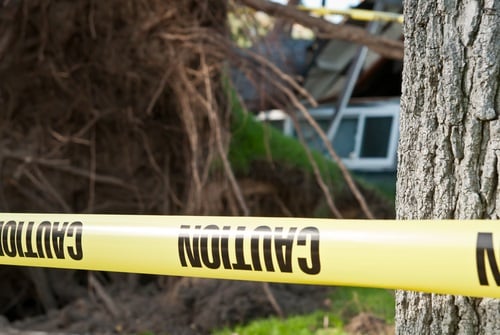
If your property has storm damage
Damage caused by tornadoes, such as wind, hail, lightning, falling objects, or debris, can be covered under standard homeowners policies and an auto insurance policy's optional comprehensive car insurance. Check out our Storm Damage Claim post.
- Be careful walking around damaged areas in your home. Inspect your home for damage and take pictures. Tornado damage can be covered by home insurance.
- If your home experiences damage during severe weather, call your local agent and report your claim online on our Member Portal or by calling our 24/7 Claims Hotline at 877-968-7252. Read our frequently asked questions about home insurance claims.
- Make temporary repairs to prevent further loss from rain, wind, or looting; these costs are reimbursable under most policies, so save the receipts. Don't throw out damaged property until you have met with an adjuster.
- While home insurance does not cover flooding, there are important steps to take to mitigate home damage from flood water.
- If you're running a generator outside, keep it dry! Exposed electrical outlets pose a serious shock hazard in wet conditions like rain. Never run it in a garage, basement, or crawl space to avoid dangerous carbon monoxide poisoning.
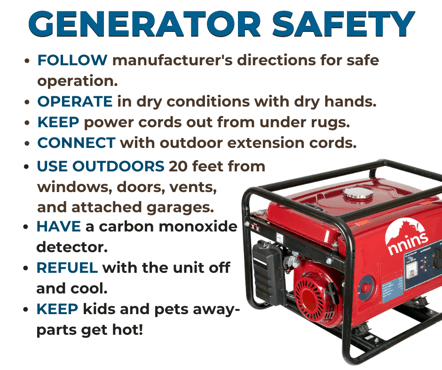
- If your home is uninhabitable because of tornado damage, your renters or homeowners insurance can cover additional living expenses (ALE) such as hotel bills or meals. Save all related receipts and ensure your insurance agent and adjuster know where and how to contact you.
- Don't rush to sign repair contracts. Do your homework, deal with reputable contractors, and get references. Be sure of payment terms and consult your insurance adjuster before you sign any contracts.
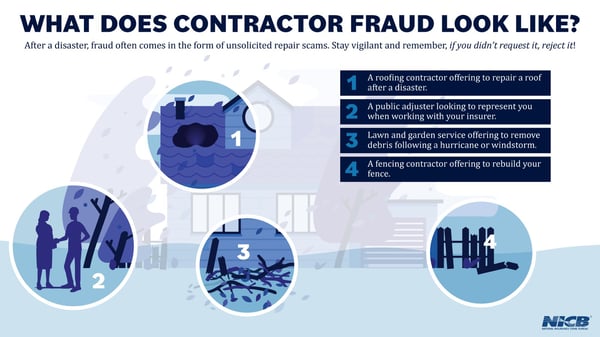
How to report a power outage
The best way to report and track a power outage in your area is online unless there is an electrical hazard. Electric utility companies get otherwise inundated with phone calls. Click on the links below to report an outage online and for information about electric utilities in your area.
- Dominion Energy 866-366-4357
- Northern Virginia (NOVEC) 888-335-0500
- Appalachian Power 800-956-4237
- Shenandoah Valley Electric (SVEC) 800 234-7832
- Southside Electric (SEC) 866-878-5514
- American Electric (AEP) 800-277-2177
- Rappahannock Electric (REC) 800.552.3904
- Community Electric (COMELEC) 757-242-6181
-
FirstEnergy 888-544-4877
Driving safely on Virginia roads during and after severe weather
Avoid travel during severe weather whenever possible
Stay home if you are able! While travel is sometimes unavoidable, delaying leaving home or work until severe weather passes is safest. Prepare to travel before imminent severe weather by contacting transportation sources for up-to-date travel information. If hail or flooding is in the forecast, moving your car to higher ground or under cover into a garage is a good idea.
Believe it or not, wet roads are the common weather influence of car crashes. Hail can cause costly damage to your car. Prepare to drive safely in the rain and protect your car from hail damage during and after severe weather with the following tips:
- Adjust your commute and telework if possible.
- Monitor forecasts closely.
- Avoid travel unless absolutely necessary.
- Turn on your headlights and drive the conditions.
- Do not drive through flooded roads.
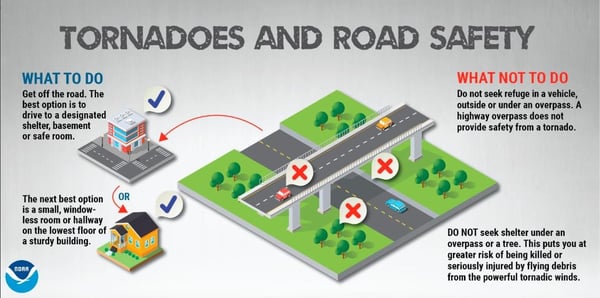
Virginia Department of Transportation online resources
The Virginia 511 Information System provides the latest traffic and road conditions by phone, website, and app.
The VDOT Safety Patrol provides free-of-charge services for interstate trouble, such as tire change assistance, fuel at the nearest gas station, jump starts, phone access, and directions.
Virginia State Police is active on Twitter: @VSPPIO and Facebook: @VirginiaStatePolice
Follow the Virginia Department of Transportation for local travel advisories on Twitter in your local area:
- Northern VA @VaDOTNOVA
- Staunton @VaDOTStaunton
- Culpepper @VaDOTCULP
- Richmond @VaDOTRVA
- Bristol @VaDOTBristol
- Salem @VaDOTSalem
- HamptonRoads @VaDOTHR
- Lynchburg @VaDOTLynchburg
- Fredericksburg @VaDOTFRED
Follow the VDOT Facebook Page and join the following Facebook groups for local advisories:
- VDOT Fredericksburg District
- VDOT Salem District
- VDOT Hampton Roads District
- VDOT Bristol District
- VDOT Lynchburg District
- VDOT Culpeper District
- VDOT Northern Virginia District
- VDOT Richmond District
What to do if you get stranded in your car during severe weather
- Stay put with your seatbelt buckled until severe weather has passed.
- Call, and wait for help. Do not leave your car unless help is visible within 100 yards.
- Indicate you need help. Turn on your hazard lights and mark your car with flares or triangles. Hang a brightly colored cloth on the radio antenna and raise the hood.
- Run the engine intermittently to keep warm or cool if needed, about 10 minutes each hour (or 5 minutes every half hour).
- Leave the overhead light on when the engine is running so that you can be seen.
- Do light exercises for circulation (avoid staying in one position for too long).
THE NORTHERN NECK INSURANCE INTEGRITY PROMISE — We pledge to provide straight talk and good counsel from our NNINS Virginia insurance experts through our blog. While we hope you find this to be a helpful source of information, it does not replace the guidance of a licensed insurance professional, nor does it modify the terms of your Northern Neck Insurance policy in any way. All insurance products are governed by the terms in the applicable insurance policy.

